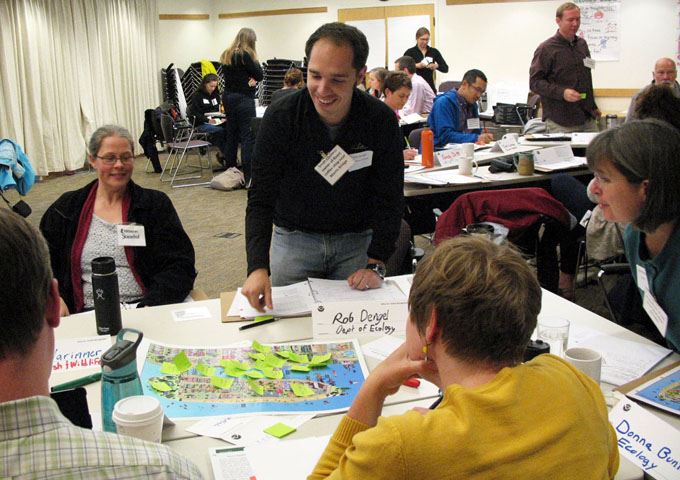 This 1-day training will empower planners and coastal managers to effectively communicate sea level rise information to their communities.
This 1-day training will empower planners and coastal managers to effectively communicate sea level rise information to their communities.
What metaphors will help your audience understand the science behind climate change? How can you effectively communicate about risk and uncertainty? How can you most effectively communicate with your stakeholders? During the workshop you will:
- Learn best practices for effective communication;
- Understand and develop communications strategies using sea level rise information in Washington State;
- Apply key concepts to individual communication challenges;
- Practice and refine communication techniques through collaborative exercises.
Lunch is provided. (6 AICP/ CEP Points)
In Spring of 2014, the Coastal Training Program hosted a training on planning for sea level rise in Washington. Participants of this one-day event requested additional in-depth training on a range of climate adaptation issues. In response, the CTP (in partnership with WA Coastal Program, UW Climate Impacts Group, WA Sea Grant, and NOAA) developed a suite of trainings and packaged them in a “Climate Adaptation Series.” This is the third class in the series. (Note: It's not necessary for you to have taken the previous classes in the series.)
Instructors: Lara Whitely Binder is a climate outreach and adaptation support specialist at the University of Washington’s Climate Impacts Group (CIG). Lara assists the CIG with its efforts to inform decision makers about the impacts of climate variability and climate change on the Pacific Northwest and is responsible for providing technical support on planning for climate variability and change to communities, organizations, and individuals across the region. Recent adaptation publications include The Sound Transit Climate Risk Reduction Project (2014), Climate Change Impacts and Adaptation in Washington State: Technical Summaries for Decision Makers (2013 - coauthor), “Preparing for Climate Change in Washington State (Climatic Change Journal, 2010; lead author) and Preparing for Climate Change: A Guidebook for Local, Regional, and State Governments (2007; co-author). Lara earned her Master’s Degree in Public Affairs at the University of Washington’s Evans School of Public Affairs in 2002.
Gwen Shaughnessy brings a background in marine biology and non-traditional education to NOAA’s Office for Coastal Management (OCM), where she joined in February of 2011. In her current role as the Climate Adaptation Specialist in the OCM Engagement, Training, and Education Program, Ms. Shaughnessy is the national coordinator and lead trainer for a multi-day climate adaptation training course. Prior to joining NOAA, Ms. Shaughnessy worked with the Maryland Chesapeake & Coastal Program, where she helped staff the Adaptation and Response Working Group for the Maryland Commission on Climate Change and contributed to the State’s Climate Action Plan. Her responsibilities also included development of the CoastSmart Communities Initiative, a program designed to improve community resilience in the face of coastal hazards and climate change. Building capacity in local communities to better understand the risks, strategies, and choices for how to adapt to the impacts of a changing climate is a focus of Ms. Shaughnessy’s work.
Susan Wood has worked as an educator at the Padilla Bay National Estuarine Research Reserve since 1988. She holds a BA in Environmental Studies from St. Olaf College and MEd in Environmental Education from Slippery Rock University. For the past 10 years, she has been delving into climate change communication, and recently completed an NSF funded climate change communication program through the New England Aquarium—the National Network of Ocean and Climate Change Interpretation.
Michael Levkowitz has a background in stakeholder engagement and environmental communications, and currently serves as the Assistant Coastal Planner at the Washington State Department of Ecology (ECY). After completing a graduate degree in Public Administration with a focus on Environmental Management, Michael joined ECY as a Hershman Marine Policy Fellow in 2015. His work at ECY has included overseeing the Coastal Hazards Resilience Network, working with Washington Sea Grant to manage the King Tides Initiative in Washington State, and providing guidance to communities seeking to improve their resilience to an array of hazards along the coast.
